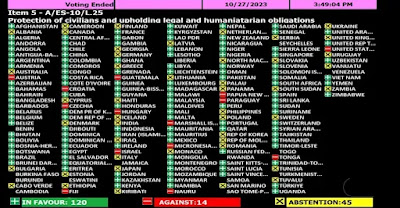I'm almost loath to do it, but maybe this is the time to do a historical review of the region known as Palestine/Israel. Not because it is going to solve any problems, but mainly because I am tired of listening to my wife's personal trainer waxing lyrical about how the Palestinian Arabs have no right to the land, because they were just brought in for cheap labour during the British Palestine Mandate in the early 20th century. I'm not sure where she gets her information, but that didn't sound right to me. There again she also says it's their own fault that Gaza is overpopulated, because they should just stop having so many babies...
So, where to start. Wikipedia is a trove of information on Palestine and its history, but there are just so many invasions, overlords and exoduses, one after the other, just so much detail, that it's just bewildering and overwhelming. Kind of like reading the Book of Genesis, and expecting to make some sense and perspective of it.
I found a more compact, manageable summary on, of all places, the Australian Institute of International Affairs' Australian Outlook website, which leads with that very question: Where to start? Or, as they put it: "Israel" and "Palestine": Where should history begin, and should it matter? (For what it's worth, the article answers that question in the negative, arguing that the history is so contested and open to interpretation that "the only way forward for Jewish Israelis and Palestinian Arabs is to cease looking backwards".)
The first known mention of something called Israel was in the 13th century BCE, when Egyptian rulers put down a rebellion in the area then known as Canaan. (Genetically, both the Jews and Arabs of the region are identical, both descended from the original Canaanites.) A few centuries later, there seems to have been two kingdoms in the area, one called Israel, and a smaller, weaker kingdom in the south called Judea (the original source of the word Jew).
Then, in 722 BCE, the powerful Assyrian empire, based in modern-day Iraq, invaded and took control of the region, and that was the end of ancient Israel as a geographical entity, until it was re-established after the 2nd World War.
In the 6th century BCE, the kingdom of Judea was also overthrown, this time by the Babylonians (also from modern-day Iraq). This is the Babylonian Exile or Captivity mentioned in the Bible. But the region continued to be the centre of Jewish culture until 135 CE, when the Roman Emperor Hadrian expelled the Jews following a disastrous Jewish uprising. This was effectively the end of Jewish existence in the Middle East, although Jewish traditions carried on in the diaspora in various parts of Europe. The region around Jerusalem was then rolled into the larger entity called Syria-Palestina (the name Palestina being a Romanization of Philistines, the age-old enemies of the Israelites).
The now predominantly Arab population of the region of Palestine continued there for the next 18 centuries or so. More and more Arab peoples settled there after the Islamic conquests of the 7th century CE but, with a brief interregnum of Crusader control in the 12th and 13th century, the area has been Arab and under Muslim control for some 12 centuries.
The Zionism movement arose in the second half of the 19th century, as Jew-hatred mounted in Europe and Csarist Russia, the first time the idea of a Jewish homeland had surfaced in millennia. By this time, the land was under Turkish Ottoman control, a small part of the Ottoman province of Greater Syria, although the Muslim Arab population remained the same as ever. When Ottoman rule finished after the 1st World War, the land fell under British rule, known as Mandatory Palestine, or the Palestine Mandate, which began in 1923.
During this period, the Zionists under David Ben Gurion started to encourage Jews to move into Palestine, in order to solidify Jewish claims of statehood there. But it was not until after the 2nd World War (and the Nazi Holocaust) that "Independent Arab and Jewish states" were proposed for the region by the United Nations. Israel immediately accepted the proposal, but the Palestinian Arabs, who felt they were being pushed out of their ancestral homeland, took up arms instead. Unfortunately, in the war that ensued, the Palestinians lost 78% of their initial UN allotment (known as al-Nakva, the Catastrophe).
Since then, life in what is left of Palestine has been a series of on-again-off-again wars, Israeli domination and effective occupation, particularly since the 1967 Six-Day War, not to mention illegal Jewish settlements on Palestinian land, pro-Israeli censorship of social media, etc. The original "two-state solution" envisaged by the UN has never come to fruition, even if three-quarters of UN members now (since independence was declared in 1988) recognize Palestine as a state.
Things only became more complicated when the radical Iran-financed Hamas took over control of the small Gaza Strip enclave of Palestine in 2007, leaving the West Bank under the more moderate Fatah (formerly the Palestinian National Liberation Movement) leadership.
And that, bear in mind, is a grossly simplified summary of the history of Palestine. It's complicated, as they say. Although, Israel as an entity technically predates Palestine, it was not the Israel of today. And Arab Pastinians have lived in the region for most of the last two millennia, so where do you start the history?
From a justice and equity perspective, both Israel and Palestine have a legitimate claim to the land, so some kind of two-state solution would seem to be the only ultimate answer. But most Arabs and most Israelis seem resistant to such a solution. There is, as was once said of Europe, too much history crammed into too little geography. The result? Political stalemate and incessant wars, of which the current Gaza conflagration is just the latest (although probably not the last).






